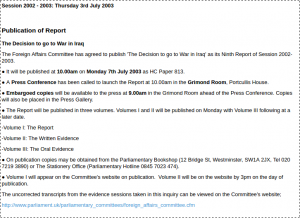The Chilcot Report (Iraq Inquiry) is an example of faking governmental transparency.
You may protest: “But look at all the files, testimony, documents, etc. How can it be more transparent than that?”
That’s not a hard question to answer.
Preventing Shared Public Discussion
The release of the Chilcot Report as PDF files, eliminates any possibility of shared public discussion of its contents.
The report will be discussed by members of the media, experts and the public. Public comments are going to be scattered over blogs, newspapers, Twitter, Facebook and other media. And over a long period of time as well.
For example, the testimony of Mr. Jonathan Powell is likely to draw comments:
“… it was a mistake to go so far with de‑Ba’athification. It is a similar mistake the Americans made after the Second World War with de‑Nazification and they had to reverse it. Once it became clear to us, we argued with the administration to reverse it, and they did reverse it, although with difficulty because the Shia politicians in the government were very reluctant to allow it to be reversed, and at the time we were being criticised for not doing enough de‑Ba’athification.”75
75 Public hearing, 18 January 2010, page 128.
Had the report been properly published as HTML, that quote could appear as:
<blockquote id=”iraq-inquiry_volume-10-section-111-para78-powell>
“… it was a mistake to go so far with de‑Ba’athification. It is a similar mistake the Americans made after the Second World War with de‑Nazification and they had to reverse it. Once it became clear to us, we argued with the administration to reverse it, and they did reverse it, although with difficulty because the Shia politicians in the government were very reluctant to allow it to be reversed, and at the time we were being criticised for not doing enough de‑Ba’athification.”75
<blockquote>
The primary difference is that with an official identifier for the Powell quote, then everyone discussing it can point to the same quote.
Which enables a member of the public, researcher, reporter or even a member of government, to search for: iraq-inquiry_volume-10-section-111-para78-powell and find every discussion that is indexed on the Internet, that points to that quote.
Granting that it depends on authors using that identifier but it enables public discussion and research in ways that PDF simply blocks.
Every paragraph, every quote, every list item, every map, should have a unique ID to facilitate pointing to portions of the original report.
A Lack of Hyperlinks
One of the more striking deficits of the Chilcot Report is its lack of hyperlinks. Footnote 75, which you saw above,
75 Public hearing, 18 January 2010, page 128.
is not a hyperlink to that public hearing.
Why should the public be tasked with rummaging through multiple documents when publishing all of the texts as HTML would enable point to point navigation to relevant material?
If you are thinking the lack of HTML/hyperlinks impairs the public’s use of this report is a rationale for PDF, you are right in one.
Or consider the lack of hyperlinks to other published materials:
Introduction to the Iraq Inquiry
- The House of Commons Foreign Affairs Committee published The Decision to go to War in Iraq on 3 July 2003.
- The Intelligence and Security Committee of Parliament published Iraqi Weapons of Mass Destruction – Intelligence and Assessments on 10 September 2003.
- Lord Hutton published his Report of the Inquiry into the Circumstances Surrounding the Death of Dr David Kelly CMG on 28 January 2004.
- A Committee of Privy Counsellors, chaired by Lord Butler of Brockwell, published its Review of Intelligence on Weapons of Mass Destruction on 14 July 2004. Sir John Chilcot was a member of Lord Butler’s Committee.
- The Baha Mousa Inquiry, chaired by Sir William Gage, was established in May 2008 and published its conclusions on 8 September 2011.2
pages 2 and 3, numbered paragraph 4.
Nary a hyperlink in the lot.
But let’s just take the first one as an example:
The House of Commons Foreign Affairs Committee published The Decision to go to War in Iraq on 3 July 2003.
Where would you go to find that report?
Searching on the title finds volume 1 of that report relatively easily: House of Commons Foreign Affairs Committee The Decision to go to War in Iraq Ninth Report of Session 2002–03 Volume I.
Seeing “volume 1,” makes me suspect there is also a volume 2. Casting about a bit more we find:
http://www.parliament.uk/business/committees/committees-archive/foreign-affairs-committee/fac-pn-28-02-03-/, of which I took the following screenshot:
(select for a larger image)
In the larger version you will see there are three volumes to The Decision to go to War in Iraq, not one. Where the other two volumes are now, your guess is probably better than mine. I tried a number of queries but did not get useful results.
Multiple those efforts by everyone in the UK who has an interest in this report and you will see the lack of hyperlinks for what it truly is, a deliberate ploy to impede the public’s use of this report.
Degree of Difficulty?
Lest anyone protest that production of HTML with hyperlinks represents an extreme burden on the Iraq Inquiry’s staff, recall the excellent use Parliament makes of the web. (I know a number of markup experts in the UK that I can recommend should the holders of the original text wish to issue a text that would be useful to the public.)
No, the publication of the Iraq Inquiry as non-hyperlinked PDF was a deliberate choice. One designed to impede its use for reasons best known to those making that decision. Unsavory reasons I have no doubt.
PS: In the future, do not accept reports with footnotes/endnotes represented in layout. As logical elements, footnotes/endnotes are much easier to manage.
